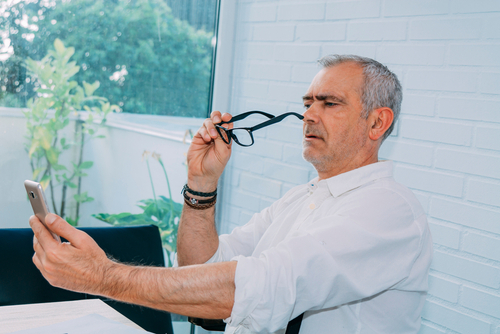
Do you tend to hold objects like your phone or a menu arm’s length away? If you’re having trouble seeing things up-close, you may have presbyopia.
Also called age-related farsightedness, presbyopia is a common eye condition for people in their forties or older. It’s so common that approximately 83% of adults have presbyopia once they turn 45. Nearly everyone has some degree of presbyopia by the time they reach 50.
Presbyopia has treatment options, but you must know you have the condition before treating it. Keep reading to find out if you may have presbyopia!
What is Presbyopia?
Presbyopia is a normal part of the aging process. With age, your eyes lose their ability to shift focus to near objects.
Light passes through your lens. To create clear images, the lens then refracts it onto your retina at the back of your eye. Presbyopia occurs because the lens of your eye becomes more rigid.
Because the lens is no longer as flexible, it cannot change shape to focus on up-close objects. When you look at things right in front of you, they appear blurry and out of focus.
Presbyopia develops gradually. It typically affects you in your forties, worsening your vision until your sixties.
It’s also possible to develop presbyopia at a younger age. Farsightedness, certain medical conditions like diabetes and cardiovascular diseases, and medications like antidepressants and antihistamines can all increase your risk.
What are the Symptoms of Presbyopia?
The hallmark symptom of presbyopia is difficulty seeing up-close objects. These include your phone, a book or newspaper, or a menu.
You may find yourself squinting. Many patients find it easier to perceive objects when holding them a foot away from their faces.
The effects of presbyopia can be worse when you are tired or when you’re in dim lighting. You may try to use additional light to help you see better, but this is usually not effective enough.
Headaches and eye strain can also occur when you struggle to focus on near objects. After time spent reading or doing other up-close work, your head may hurt, and your eyes may feel tired.
Presbyopia does not get better on its own. Your vision will continue to worsen until you are in your mid-sixties, around which point it will stop worsening but will not improve.
You may have presbyopia if you’re having trouble performing up-close work and are 40 or older.
How is Presbyopia Diagnosed and Treated?
If your near vision isn’t clear, it’s best to schedule an exam. Your eye doctor can diagnose presbyopia as part of a standard eye exam.
Drug store reading glasses may help. You can also treat presbyopia by using prescription glasses that only need to be worn when performing up-close tasks. Contacts are an option as well. Many new bifocal and multifocal contact lenses are now available.
Some patients choose to undergo surgery to correct their presbyopia. Refractive procedures like LASIK, PRK, or RLE can make a huge difference when done as monovision.
For those who want to avoid the need for glasses and not undergo surgery, we also offer Vuity eye drops. These advanced drops temporarily give you the effects of reading glasses without having to wear any.
Are you worried you might have presbyopia? Make your near vision clear again by contacting Fichte, Endl & Elmer Eyecare at 1-800-309-2020 to request an appointment in Buffalo, NY, today!


